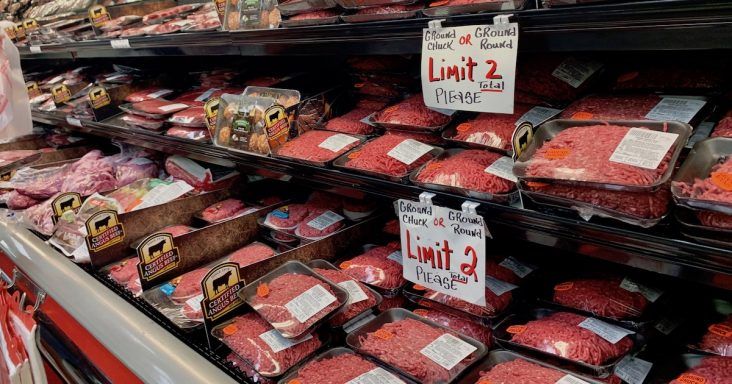Grocers struggle with meat supplies because of consumer demand, plant closures
by May 5, 2020 2:14 pm 1,429 views

The meat case at Allen's in Bella Vista.
There is no shortage of meat in the U.S., say Cargill CEO David MacLennan and Tyson Foods CEO Noel White. However, temporary shutdowns and slower line speeds in beef, pork and poultry plants and consumer demand have left grocery cases picked clean in recent days.
Grocery giant Kroger on May 1 began placing purchase limits on ground beef and fresh pork after receiving less meat from its major suppliers. Kroger echoed the sentiment that there is plenty of protein and said it would continue offering a wide assortment, but noted some stores could see temporary gaps in their meat supply.
Walmart has said it does not expect it will need to set product limits on meat. It is working with its meat suppliers to convert production lines that normally process meat for the foodservice industry and redirect it for retail sales. Walmart is also focusing on supplying the most-commonly bought meat products instead of those requiring more time to process. Walmart buys only case-ready meat because it does not employ butchers who can cut-up and package the larger cuts. Tyson Foods said Monday (May 4) it is working with large retail customers to do the butchering in plants that have seen lost demand from restaurant closures.
Independent grocery Allen’s Foods in Bella Vista is also seeing days when consumers pick the meat cases nearly clean. Allen’s has placed temporary limits on some cuts like ground round during high demand days to give its butchers time to process and package more.
“Last Tuesday we saw meat sales at five times their normal volume after the newspaper ad from John Tyson,” said Steve Morrow, manager of Allen’s Foods. “Three days into the coronavirus outbreak we started to get less meat from our main supplier. I get three shipments a week and the amount I am getting today is about 65% of pre-COVID levels.”
Morrow said by day five of the buying frenzy in mid-March he was able to purchase meat from a local restaurant owner who had been closed for eat-in dining and offering a limited menu for take-out. Morrow began phoning other restaurant suppliers and has a group of five more he’s buying meat from each week.
Allen’s employs five butchers and can take large cuts of beef and pork and trim and cut the selections customers want. Morrow said with a shortfall in prepackaged chicken, his butchers have been taking whole birds and doing the cut-up and packaging, something they have not done in years given most retail chicken is packaged in parts at the processor.
“For us, there has been a bigger shortfall in pork and chicken than in beef. We also have seen less popular cuts of beef are virtually impossible to find. For the most part, we have a fully-stocked meat case every day, but it’s a lot more work than it used to be,” Morrow said.
Another challenge for grocers is price volatility. Morrow said typically grocers get price protection for promotional cuts to be offered three days out. But in this environment, the price is now typically only good for one day, which makes it impossible to plan for meat features. Morrow said when he gets a load of meat in stock the special will start the next day, using social media to notify shoppers. He said the buying frenzy is impossible to predict or plan for, but because the operation is nimble and has butchers on staff, it has been able to keep its meat cases stocked. The only exception has been when the case sells out faster than the butchers can cut and package.
Morrow said the challenges are real, despite there being plenty of meat. He starts his day with a phone call to meat suppliers to see what’s available and what it’s going to cost. That’s followed by meeting trucks at the store five days a week to get the meat he’s ordered and hoping it lasts until the next truck arrives. Morrow said he doesn’t understand the sentiment behind buying freezers and stocking up on meat at near-high prices. But consumers are still doing it. With meat plants now ordered to run and companies like Cargill and Tyson paying bonuses and taking extra measures to protect workers, he believes the capacity situation is temporary.
Tyson Foods said during its Monday earnings call that all of its plants were having some degree of absenteeism and some of that is based on workers who have children sent home from school three months before the typical summer vacation. Tyson and Cargill execs each said they are committed to staying open, while there will be temporary challenges in staffing plants, testing employees and taking steps health officials recommend for keeping employees safe.
